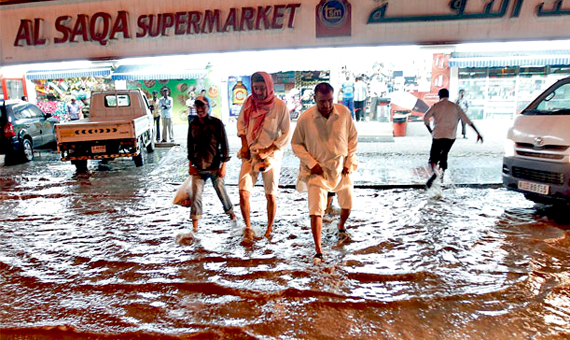
Dubai, Nov 18: Foggy conditions, low visibility caused by dust storms, and mild showers resulted in disruption of road traffic across the Emirates on Sunday, with incidences of mild to heavy showers in Sharjah, Fujairah, Ajman, Kalba, and neighbouring areas.
The UAE’s National Centre for Meteorology Seismology (NCMS) has confirmed that rains will continue on Monday, in Fujairah, Sharjah and Ajman, but rubbished rumours of a hurricane likely to hit.
An NCMS spokesperson said the weather would be unstable in the coming day or two, with flash floods likely.
Fujairah and Al Hamra also experienced thunderstorms and relatively heavy showers on Sunday. The waters of the Arabian Gulf and the Sea of Oman will be rough due to the storms over the coming days, and fishermen are advised to take precautions while out at sea.
The official Twitter account of NCMS tweeted: “It is expected that the rain clouds will affect different parts of the state in the coming hours, may be accompanied by floods in mountainous regions.”
Residents also reported dust storms from Dubai and Sharjah on Sunday afternoon, which caused low visibility and disruption to road traffic and motorists have been advised to exercise caution on the roads as the disruptive weather continues.
“It is expected to be partly cloudy at times over some of the northeasterly areas by noon. Slight to moderate winds in general and relative humidity will increase during night and early morning,” the spokesperson added.
Hurricanes or floods unlikely
However, NCMS has confirmed that a hurricane or major floods are unlikely to hit the UAE, but said the country should expect rains, with many areas remaining overcast.
The NCMS rebuffed rumours attributed to the US Navy about the existence of hurricanes and floods across the country, saying they were merely an ‘exaggeration’.
The NCMS said any news traded via social networking sites about this case should be referred to the centre. The centre also emphasised the country was currently under the influence of unstable weather conditions leading to a different intensity of rain over scattered parts of the country periodically.
“The centre is warning (against visiting the) Oman and Arabian Gulf sea and (has advised people to) stay away from running valleys, adding that precautions must be taken in case of rain on high roads,” the NCMS said in a statement.






Comments
Add new comment